Negligence or inability to file a tax return, when you owe the IRS is an invitation to trouble. Many taxpayers are unaware of the fact that an unfiled tax return is worse than filing a return and not paying the due amount. If you are unable to pay your taxes, the IRS has avenues to help you pay what you owe the agency. Not filing a tax return is a crime, and you could be severely punished by the IRS. This blog post gives a brief overview of the four main consequences of not filing a tax return. Read on.
1. Paying penalties and interest
Not filing a tax return exposes you to penalties and interest payments. If you owe taxes, two penalties you may face include:
Failure-to-file-penalty – A late penalty, which is 5 percent of the total tax due is imposed when you do not file a return. The penalty grows for every full or partial months you don’t file your taxes and can grow to 25 percent.
Failure-to-pay-penalty – When you don’t pay outstanding taxes, the IRS imposes a penalty of 0.5 percent of what you owe.
The IRS also charges interest on unpaid taxes, which is between 3 to 10 percent, on a quarterly basis.
2. Loss of refund and other tax benefits
The IRS gives you a time period of three years to file returns to claim a refund. If you don’t file the tax in time, consider any money owed to you by the IRS lost. The same time limit is applicable when taxpayers want to claim a tax credit. If you don’t file a return, you cannot claim the credit in later tax years. Self-employed individuals do not get any disability benefit or social security retirement if they don’t file their returns.
3. A substitute return being filed on your behalf
If you do not file a return, the IRS might file a substitute return using your 1099 or W2s forms. While you may think of substitute return as relief from hassles of filing tax, it eventually costs you more in the long run. The reason being, when a substitute return is filed, the taxpayer gets one exemption and standard deduction. If you qualify for a tax credit, have a substantial amount of itemized expenses, or dependents, none of them would be considered as a waiver, which will reflect in the form of an exaggerated tax liability.
4. Face collection actions
If the IRS performs an assessment of the substitute return, you are close to facing collection actions. The type of enforcement depends on the amount you owe the IRS and circumstances that led to non-filing of your tax return. The IRS may seize your assets, including bank accounts, home, vehicle, or other personal property, place a lien against your property, or turn the issue into a criminal case. If the IRS takes hold of your assets, SSI, child support payments, and disability benefits are exempted from seizure.
How do I go about filing old returns, especially if I am missing information?
This is how we prepare tax returns for our clients who are missing records:
We first pull something called the W&I transcript to find all tax reporting forms like 1099s and W-2.
We research old property tax bills.
If our clients are self-employed and have unfiled tax returns, we will have our clients give us their old bank statements and we will recreate profit and loss statements.
The same is true if you are the executor or administrator of an estate of someone who has not filed taxes in a long time. We would follow the same process, and then you, as administrator or executor, would then sign each return to the best of your knowledge.
